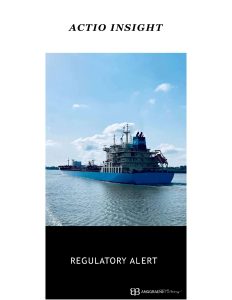Regulatory Alert: New Requirements for Indonesian-Flagged Ships – Guarantee Funds for Oil Pollution Compensation
Background
The Directorate General of Sea Transportation (“DGST”) as the Indonesian maritime regulatory authority, has issued a Circular Letter Number SE-DJPL 4 Of 2023 concerning The Obligation Of Indonesian Flag Vessels to have a Certificate for Oil Pollution Compensation Guarantee Fund and/or a Fuel Oil Pollution Compensation Guarantee Fund in Order to Ensure Seaworthiness (“CL 4/2023”). CL 4/2023 carried out the mandate on the obligation for obtaining certificate of prevention for oil pollution damage for certain Indonesia flagged vessels that was first introduced in Ministry of Transportation Number 29 of 2014 concerning Prevention of Maritime Environmental Pollution and its amendment (“MoT 29/2014”). CL 4/2023 features important changes concerning the liability and compensation mechanisms for oil and fuel oil pollution by ships.
Key Requirements
- All Indonesian flag ship owners and operators is mandated to:
- Immediately process insurance for the Pollution Compensation Guarantee Fund originating from cargo oil and/or ship fuel oil;[1]
- Submit application for certificate issuance to the Director General of Sea Transportation c.q. Director of Shipping and Maritime Affairs in accordance with the provisions of statutory regulations;[2] and
- Pay levy for the issuance of the certificate pursuant to Government Regulation Number 15 of 2016 concerning Types and Tariffs for Types of Non-Tax State Revenue Applicable to the Ministry of Transportation.[3]
- The types of certificates, contingent upon the classification of the ship, that will be issued by the DGST are as follows:[4]
- Certificate of Insurance or Other Financial Security in Respect of Civil Liability for Oil Pollution Damage;
- National Certificate of Insurance or Other Financial Security in Respect of Civil Liability for Oil Pollution Damage;
- Certificate of Insurance or Other Financial Security in Respect of Civil Liability for Bunker Oil Pollution Damage; and/or
- National Certificate of Insurance or Other Financial Security in Respect of Civil Liability for Bunker Oil Pollution Damage.
- Reiterating MoT 29/2014, the classification of ships and their respective required certificate are as follows:[5]
- Ships carrying bulk oil cargo of 2000 (two thousand) tons or more are required to have Certificate of Insurance or Other Financial Security in Respect of Civil Liability for Oil Pollution Damage;
- Ships with a size of GT 1000 (one thousand gross tonnage) or more are required to have Certificate of Insurance or Other Financial Security in Respect of Civil Liability for Bunker Oil Pollution Damage;
- Ships carrying bulk oil cargoes ranging from 150 (one hundred and fifty) tons up to 1999 (one thousand nine hundred and ninety-nine) tons are required to have National Certificate of Insurance or Other Financial Security in Respect of Civil Liability for Oil Pollution Damage.
- Ships with a size of GT 100 (one hundred gross tonnage) up to GT 999 (nine hundred and ninety-nine gross tonnage) are required to have National Certificate of Insurance or Other Financial Security in Respect of Civil Liability for Bunker Oil Pollution Damage.
This mandate has been introduced in the interest of affirming and ensuring ship seaworthiness. It also provides more details on the role DGST in issuing certificates of prevention for oil pollution damage.
Implications:
- Operational Impact
Ships without the stipulated certificates may face operational restriction potentially impacting trade and shipping activities. According to CL 4/2023, harbormaster is authorized to delay the departure of ships to sail for failure to obtain certificates.[6]
- Financial Impact
In addition to any potential compensation costs from pollution incidents, ship operators might need to consider additional financial provisions to obtain and maintain these certificates.
- Legal Impact
Non-compliance may lead to Port Clearance refusal or Port Clearance revocation.[7]
Consider:
- Immediate Compliance
If you operate an Indonesian-flagged ship, we recommend procuring the required certificates at the earliest to ensure uninterrupted operations.
- Legal Consultation
Consider consulting with maritime legal experts to understand the nuances of the new requirements and the broader implications for your operations.
3. Engage with Authorities
It might be beneficial to engage directly with the maritime regulatory authority or relevant bodies to seek clarifications, if any.
Conclusion:
This is a significant development for all stakeholders involved in the Indonesian maritime sector. We advise all our clients with operations or interests in the region to take cognizance of this change and act accordingly to ensure compliance and smooth operations.
[1] Number 5(a) CL 4/2023
[2] Ibid.
[3] Ibid, Number 5(c).
[4] Ibid, Number 5(b); Article 39A(1) MoT 29/2014.
[5] Articles 39(1), 39(2), 39(3), 39(4) MoT 29/2014.
[6] Number 5(b) CL 4/2023
[7] Article 134 and Article 242 of Law Number 17 of 2008 concerning Shipping
For further information, please contact:
P: 6221. 7278 7678, 72795001
H: +62 811 8800 427
Anggraeni and Partners, an Indonesian law practice with a worldwide vision, provides comprehensive legal solutions using forward-thinking strategies. We help clients manage legal risk and resolve disputes on admiralty and maritime law, complicated energy and commercial issues, arbitration and litigation, tortious claims handling, and cyber tech law.
S.F. Anggraeni
Managing Partner
Disclaimer:
This alert is meant for informational purposes only and should not be construed as legal advice.

